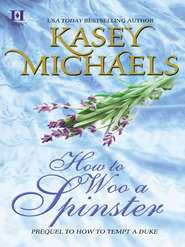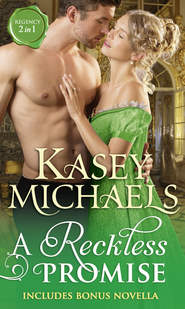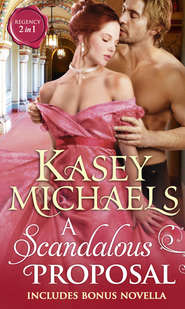По всем вопросам обращайтесь на: info@litportal.ru
(©) 2003-2025.
✖
Romney Marsh Trilogy: A Gentleman by Any Other Name / The Dangerous Debutante / Beware of Virtuous Women
Автор
Год написания книги
2018
Настройки чтения
Размер шрифта
Высота строк
Поля
“Oh, Mr. Becket, sir,” Gibbons said, pushing his way through the small crowd of maids and footmen—and one young girl wearing an overly large white apron and holding what looked to be a half-plucked pigeon. “It’s Mrs. Jenkins, sir, and Miss Carruthers with her, poor thing. She’s not going quietly.”
“Not going where?” Chance asked, then stopped, flabbergasted at his own stupidity. He’d hired Julia Carruthers. Obviously, as Mrs. Jenkins had refused to relocate herself to Becket Hall. It was all perfectly logical, to a point, with only one minor yet rather important detail overlooked. He hadn’t told Mrs. Jenkins to take herself off, had he?
But these had been his decisions, damn it all to hell, even if he hadn’t as yet quite gotten around to explaining them to Mrs. Jenkins before leaving for the War Office. Now there were two nannies in the household, and one of them had become instantly superfluous. Gibbons had referred to Miss Carruthers as the “poor thing.” God. Had the older woman attacked her unwary replacement?
“Where is Alice?” he asked Gibbons. “And unless you want your head on a pike and your carcass pickled, tell me my daughter isn’t in there.”
Gibbons flinched. “Oh, no, sir. Bettyann’s got her all right and tight up in the nursery. It’d been the other way round, with Bettyann and MissAlice down here, but then Mrs. Jenkins comes running down the stairs—the front stairs, sir!—screeching for you at the top of her lungs, and Miss Carruthers right behind her. So Bettyann—she’s a good one, sir—she snatches up Miss Alice and takes her off, and…Oh, sir, you really shouldn’t have left things up in the air, sir, begging your pardon.”
“How can a man believe himself competent to help manage the war effort when he cannot so much as maneuver his way in his own household? No, Gibbons, don’t answer, it isn’t necessary. Everyone, take yourselves back to wherever you belong. Not you, Gibbons. You have someone pack up Mrs. Jenkins’s things and have them at the servants’ entrance in ten minutes.”
“Yes, sir,” Gibbons said, bowing. “And Miss Carruthers’s cases are already sitting in the kitchens ever since Richards fetched them from the White Horse. Shall I have them taken up to the nursery?”
“Whatever you think is right, Gibbons. I believe I’m quite done with managing domestic matters,” Chance said, then squared his shoulders and headed for the double doors…and the commotion going on behind them.
He spied Mrs. Jenkins the moment he pushed open the doors, the rather large woman standing in the middle of his drawing room, her fists jammed onto her hips as she stared across the room.
“And I say I stay right here until the bugger brings himself home! Then we’ll see, missy.”
Chance took three steps into the room, at last seeing Julia Carruthers as she sat, with her exceptional posture, in a chair near the front windows, looking as calm and placid and as regal as the queen on her throne. Vicars’ daughters obviously must be made of stern stuff!
“Shall we be forced to go through this again? I smelled the gin, Mrs. Jenkins,” Julia said, not noticing Chance’s presence, as she was wisely keeping her gaze solidly on Mrs. Jenkins, who looked more than ready—and able—to launch herself toward her. “You are, madam, a disgrace and an abomination, and so Mr. Becket will be told when he at last deigns to bring himself home and take care and command of his own household.”
Insults from both women, Chance realized. First a bugger, and then, clearly, a total failure at managing his household. Standing still and waiting for more damning revelations really didn’t appeal, so he said, “Ladies? At long last, the bugger’s home. May I ask what’s going on here?”
Julia Carruthers, he noticed, was intelligent enough to keep her mouth firmly shut, but he wasn’t quite so fortunate with Mrs. Jenkins.
“There you are!” she said, turning on him. “This…this girl dared to turn me off, tell me to leave. I’ll not be listening to the likes of her, let me tell you! Your lady wife took me on just afore she died, Lord rest her, and I’ve been doing my job just as I aught and I won’t be—”
“Your belongings and a five-pound note will be outside the servants’ entrance in ten minutes, Mrs. Jenkins. I would suggest that you be there to gather them up or else remain here and explain to me why I shouldn’t personally toss your gin-soaked self onto the flagway. An action, by the way, from which I would derive great pleasure and satisfaction.”
He couldn’t quite suppress a smile as the shocked woman opened and closed her mouth several times before picking up her skirts and running from the room.
Julia could no longer contain herself. “You’re going to give that terrible woman five pounds? She doesn’t deserve a bent penny. In any event, I was handling the matter.”
“I beg your pardon?” Chance slowly turned to look at Miss Carruthers, who had risen from her chair and was now walking across the room toward him with some determination, her arms folded beneath her bosom. Lord, but the girl was in a fury.
Julia knew the words I beg your pardon had sounded, in tone, much more like This is none of your business, you cheeky twit. But she’d just spent nearly an hour with Mrs. Jenkins, a woman with absolutely no redeeming qualities. She was, quite simply, too tired, too hungry and much too angry to stop herself.
“We’ll dispense with the small fortune you plan to gift the creature with, Mr. Becket, and concentrate on the woman. You knew that dreadful person was all but a sot and yet you kept her on?” She pushed one arm up straight and pointed toward the ceiling. “May I remind you in case the fact has slipped your mind—that’s your child up there, Mr. Becket.”
Chance was stung into explaining himself. “I would have one of the maids bring Alice to me when I wished to see her. I didn’t really know much about Mrs. Jenkins. Not until last week, when I informed the woman we’d be leaving for Becket Hall and she would remain there with Alice and I realized that she was totally—oh, the devil with it! Who are you to question me?”
Julia’s anger left her as self-preservation raised its not very noble but definitely necessary head. “I’m sorry, sir. I shouldn’t have taken it upon myself to dismiss Mrs. Jenkins. And I have no right to badger you about your…your arrangements concerning Alice. In my defense, I can only say that it has been a long day. A very long day.”
As it had been for him. “And about to become longer, Miss Carruthers,” Chance said wearily, “for we leave for Becket Hall at six tomorrow morning, a very convenient leave-taking or else I would replace you. However, you, madam, having routed Mrs. Jenkins, are now in charge of preparing my daughter for the journey. Oh, one thing more. May I say how gratified I am to see that Alice now has a tiger to defend her, although I would remind you that she needs no defense from me. And now, if you don’t mind, I believe your place is in the nursery, while mine is here, getting myself dedicatedly drunk.”
“Yes, sir. Forgive me, sir. Good evening to you, sir,” Julia said, curtsying to the man when she’d really much rather be boxing his ears. She then quickly swept past him and into the hallway, where Gibbons, with a slight nod of his head and shifting of his eyes, directed her toward the back of the house and the servant stairs.
CHAPTER THREE
THE JOURNEY BEGAN AS did many journeys in England—amid a damp drizzle and accompanied by considerable fog.
Julia had roused Alice at five, only long enough to direct the child to the water closet and then wash her face and hands before pushing her reluctant limbs into a short blue gown Julia considered suitable for travel and a fur-trimmed blue coat with matching bonnet. She then carried the child down three flights of stairs and hoisted the once-again-sleeping princess into the traveling coach and wrapped her in a coach blanket.
Six o’clock of the morning, indeed! Did the man possess no sense at all?
“Watch her, please, Bettyann,” Julia asked of the housemaid who had followed behind Julia carrying Buttercup and a small portmanteau Julia had filled with items she considered necessary for a child’s comfort inside the coach. “I’ll only be a minute.”
Julia paused a moment to look at the fog that all but obscured the street. At home there was nearly always a morning mist, but it was white and smelled like fresh grass and the sea. Here the fog was yellow, dirty. She believed she could actually taste it. “Why did I ever think I would care for London?” she asked herself, then hiked up her skirts with more of an eye toward speed than decorum and headed up the steps once more, for she’d left her bonnet, gloves and pelisse in the nursery.
“Here now,” Chance Becket said warningly, grabbing at her shoulders as she all but cannoned into him, her gaze directed on the steps. “There’s no need for such a rush, is there?”
Julia looked up at the man, struck yet again by his fine good looks and, this morning, the hint of real humor in his eyes. He was dressed for travel, a gray many-caped greatcoat hanging from his broad shoulders, the snow-white foam of his neck cloth visible at his throat, and he wore a matching gray curly-brimmed beaver hat.
Tall, handsome, his smile almost boyish even while the sparkle in his eyes told her he was far from a boy. Julia sent up a short prayer that she wouldn’t disgrace herself by swallowing her own tongue, drat the man.
“You said six o’clock, sir,” she reminded him, doing her best to ignore the heat of his hands that could be felt through the thin stuff of her gown.
“Ah, so this is not Miss Julia Carruthers, is it? You only look like the woman. The Julia Carruthers I met yesterday would not only have snapped her fingers at my reasonable request but also told me she’d be ready to travel when she was ready to travel and not a moment before. I do believe I like this Julia Carruthers much more.”
“You have considered the fact that a five-year-old child travels with you, haven’t you, sir? That a long day and fresh horseflesh along the way could get you to the coast by very late this evening, but that such a punishing pace could be harmful to this child?”
“To Alice, Miss Carruthers. I do remember my child’s name,” Chance said, bristling. If he only had time to replace this infuriating woman, he would be a happy man. Ainsley would love her belligerent spirit, though. Since Chance was all but dumping Alice into his adopted father’s lap, he might as well sweeten the pot…a thought that, rather than warm him, sent a chill straight to the bone. “She’ll be fine.”
“Of course, sir. You wouldn’t have it any other way,” Julia said, then rolled her eyes the moment she was past him and on her way up to the nursery again, and hang the fact that she’d opted for the main staircase. “Idiot,” she grumbled, hiking her skirts once more before she began the climb.
She halted on the second-floor landing as Gibbons directed two footmen who were carrying baggage on their shoulders toward the servant stairs, then looked down the front staircase, assured herself she was alone.
Wetting her lips, and with one more quick glance over her shoulder, she then gave in to what her father had termed her most besetting sin. She tiptoed down the hallway, into the bedchamber that had to belong to Chance Becket.
She didn’t know precisely why she wanted to see the chamber, unless she hoped to glimpse something of the man there. And if that was the case, she was instantly disappointed.
The man lived like a Spartan, the large chamber nearly devoid of any ornamentation save a few nondescript paintings on the walls. His brushes and many personal items were, of course, already on their way downstairs to the traveling coach, but there was something so empty, so impersonal about the room, that Julia wrapped her arms around her as if to fight off a chill.
“Lost your way, Miss Carruthers?”
Chance didn’t know whether to be angry or amused when she jumped, gave out a small startled squeal before turning about to face him, her eyes wide in her ashen face.
“I…I thought only to be certain that all of the baggage has been removed. And…and it has.” She lowered her head and took a step forward, but he stepped to his right, blocking her way. “Excuse me, sir.”
“You’re very efficient, Miss Carruthers,” Chance said, deciding, yes, he’d much rather be amused. “I vow, I’ve discovered a rare diamond and taken her into my employ. Has my valet packed up my tooth powder, or haven’t you inspected my dressing room as yet? Oh, and the drawers? Have you checked them. You know, the drawers containing my most personal items of clothing?”
Julia gave it up and just sighed. “Oh, all right, so I was poking my nose where it doesn’t belong and you caught me out at it. You’re delighted to have caught me, and I’m sorry you did. I merely wanted to see if there was something I could learn about you that might help me in understanding…” She took a breath and said what she had thought. “How do you live without things?”
Chance’s humor was rapidly dissipating now. “Excuse me?”
“Things, sir. Personal things. My father had a collection of shaving brushes with decorated handles he was fond of and an entire rack of strangely shaped pipes he’d collected. They’re gone now, of necessity sold, but he always kept them in his chamber where he could see them. And some shells he’d gathered and a small portrait of his sister and…and you have nothing. The maids must be quite pleased, as dusting your few bits of uncluttered furniture couldn’t take but a moment.”











